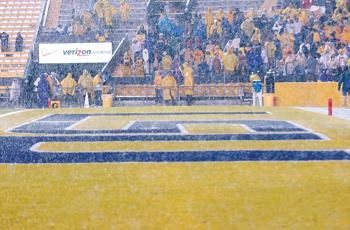The Southeastern Conference is well-known not only for the success of its football programs, but for the size and intimidation factor of its football stadiums.
The SEC boasts three of the six largest on-campus college football stadiums in the nation. Two of the teams that call those stadiums home, the LSU Tigers and Tennessee Volunteers, face off Saturday in Tennessee’s Neyland Stadium.
Neyland Stadium, which was first constructed in 1921, ranks third on the list of largest on-campus stadiums with a capacity of 104,079. LSU’s Tiger Stadium, which hosted its first game in 1924, ranks sixth with a capacity of 92,400.
Michigan Stadium, home of the Michigan Wolverines, is the largest on-campus football stadium with a capacity of 107,501. The Wolverines’ arch-rival, the Ohio State Buckeyes, sit second on the list with 107,282.
The University of Georgia’s Sanford Stadium ranks just ahead of Tiger Stadium with a capacity of 92,746
Stadium size has the ability to leave some players in awe, but some players say the fans that fill the seats are the key to providing home-field advantage.
“The first time I played at LSU was last year,” Shreveport native and Tennessee senior cornerback Jonathan Wade said. “You look around, [and] you hear the noise. That crowd is amazing. They’re always into the game. They’re always loud.”
Wade said playing in Neyland Stadium gives Tennessee an advantage when visiting hostile environments on the road.
“We’re adapt, and I’m pretty sure [the Tigers] are too,” he said.
The Tigers and Volunteers have successfully used their home fields to their advantage in recent years.
LSU has a 29-5 home record since 2001, including a 30-27 overtime loss to the Volunteers in September 2005. Tennessee has 27-11 record at Neyland Stadium in the same time span.
University of Alabama defensive end Wallace Gilberry said both venues are difficult to play in, but stadium structure gives one the advantage.
“Tiger Stadium is tough,” Gilberry said. “To me, it’s more closed in than Neyland Stadium. You don’t get much of an echo [in Tiger Stadium]. [The crowd] is like right there in your face.”
At least one SEC coach said he thinks defenses have an easier time than offenses on the road in the conference.
“I think anywhere you go in the SEC when you go on the road is a tough venue,” said Tennessee defensive coordinator John Chavis. “The crowd noise is always a factor. I think noise probably affects offense on the road a little bit more. To be quite honest, noise sometimes affects us at home as well.”
Chavis said Tiger Stadium’s atmosphere always makes it one of the toughest places to play in the nation.
“LSU fans are always into the game,” he said. “It’s a great venue. Playing down there at night makes it even a better place to play.”
Gilberry said crowd noise in Tiger and Neyland stadiums seldomly affects communication on the field.
“Most of our calls are signaled so that [crowd volume] is not really a big deal,” he said. “We very seldomly make line calls out there on the line of scrimmage.”
Florida senior quarterback Chris Leak, who led the Gators to a 21-20 victory at Neyland Stadium on Sept. 16, said choosing which stadium is the worse place to play in is a difficult choice.
“Each stadium has the ability to be loud and each can create a great home field environment,” Leak said. “It would be hard to say which is the toughest place to play.”
—–Contact Tyler Batiste at tbatiste@lsureveille.com
Home stadiums tough venues for LSU, Tenn. opponents
November 3, 2006

Rain falls on the field in Tiger Stadium before the Tigers game against Fresno State on Oct. 21. LSU has the sixth largest stadium in the nation with a capacity of 92,400. Tennessee’s Neyland Stadium ranks third in capacity at 104,079.



